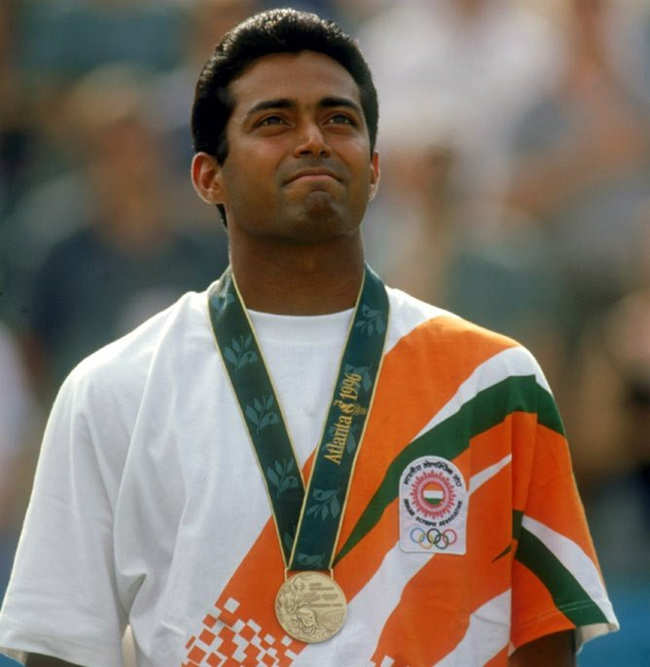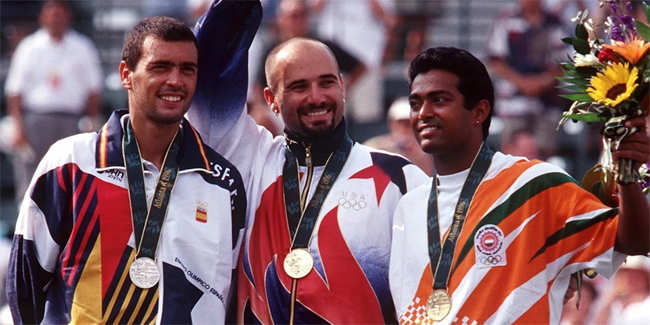India’s Olympic Firsts: Leander Paes’s 1996 bronze made India believe again | Tennis News – Times of India
As India prepares for the Tokyo Olympics, Paes may not be part of the contingent, but his redefining seven consecutive appearances at the Games have already etched his status as arguably one of India’s greatest Olympians in stone.
To add perspective, such was the impact of his men’s singles tennis bronze at Atlanta 1996 that never since then has India returned from the Olympics empty-handed.
Leander was never short of inspiration at home. In his father, Vece Paes, he had an Olympic medallist in the house. Paes Sr was a member of India’s hockey team that won bronze at the 1972 Munich Olympics.
Since August 1996, those two medals have been sitting next to each other in the Paes household.
Leander Paes shares the story of his 1996 Olympic medal | Throwback Thursday
Leander was 23 when he went to Atlanta, his second Olympic appearance. In Barcelona four years ago, he had come close to winning a medal in men’s doubles, playing with Ramesh Krishnan. But the hopes ended in a quarterfinal defeat.
“When Ramesh Krishnan and I lost a chance to win an Olympic medal in 1992…I realised that Ramesh was retiring and he was not going to be around for the 1996 Olympics,” Leander said last year on the show ‘The Finish Line’, hosted by squash player Saurav Ghoshal.
“I also realised that there were no youngsters who were going to be prepared enough to win a medal in Atlanta. In 1992, I was only looking to get to the Olympics. And then when I came so close to winning a medal, I sat on the bench after we lost the quarterfinals for around two hours and 45 minutes.”
It was right then that Leander started his preparations for the next Olympics. He was sure, both in his mind and heart, that he will have to look at the singles draw to make a mark in Atlanta.
“I reinvented my train of thought and decided to transform my physical strength and mental aptitude for singles competitions between 1992 and 1996,” Leander had said on the show.

(Photo source: Twitter)
Leander entered the competition in Atlanta as a wild card. He was 23 then, with a spring in his step, and drawn to play Pete Sampras in the first round, until the American withdrew.
Leander’s preparation and “reinvented train of thought” started reaping benefits and the Indian saw himself into the semifinals of the men’s singles competition. But there was a small problem: Leander was up against Andre Agassi in the semis.
The first set surprised Agassi. He had to fight tooth and nail to win it 7-6. Years later, in his autobiography ‘Open’, Agassi described his feelings.
“In the semis I meet Leander Paes, from India. He’s a flying jumping bean, a bundle of hyperkinetic energy, with the tour’s quickest hands. Still, he’s never learned to hit a tennis ball. He hits off-speed, hacks, chips, lobs — he’s the Brad of Bombay,” wrote Agassi.
I’ll never get over this day. Just another boy who believed he could. But it took a LOT more than just belief. Look… https://t.co/O2FnhWT6qz
— Leander Paes OLY (@Leander) 1564845843000
“Then, behind all his junk, he flies to the net, covers so well that it seems to work. After an hour, you feel as if he hasn’t hit one ball cleanly — and yet he’s beating you soundly. Because I’m prepared, I stay patient, stay calm, and beat Paes 7-6, 6-3.”
By Leander’s own admission in a column for ‘Sportstar’, such was the ferocity of Agassi’s backhand shots that it injured the Indian’s right wrist and for the next 24 hours it was in a cast.
Entry into the semis had ensured Leander two shots at the medal. One was snatched away by Agassi, the eventual gold medallist, and the next was against Brazil’s Fernando Meligeni in the bronze-medal playoff.

(Photo source: Olympics.com)
But the injury hadn’t healed enough to bear the brunt of a high-pressure match. Leander, though, decided to play against medical advice.
He lost the first battle (set) 3-6, but not the war. In fact, he put some more steel into his resolve for the next two sets and won those 6-2, 6-4 to end India’s wait.
The final result, a most unexpected bronze, was worth every ounce of that effort, so much so that 25 years since that day, it remains India’s only Olympic medal in tennis.
For all the latest Sports News Click Here
For the latest news and updates, follow us on Google News.

